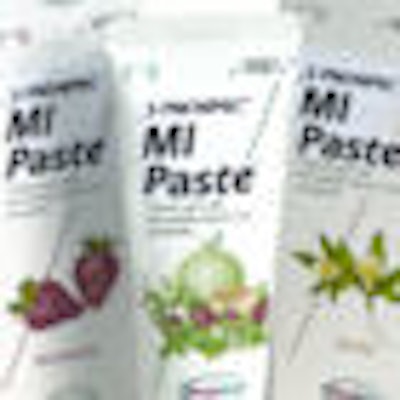
A study comparing five well-known remineralization paste products found noteworthy differences in calcium release, pH, and dentin tubule occlusion, according to researchers from Dentsply. In addition, fluoride release was unaffected by the presence of soluble fluoride with a remineralization agent in all the products tested.
Their findings will be presented March 18 in a poster session at the International Association for Dental Research (IADR) meeting in San Diego.
Nupro Prophy Paste with fluoride (Dentsply) served as the control, and the following five products were tested against it:
- Nupro prophy paste with fluoride and NovaMin (since cobranded with GlaxoSmithKline's Sensodyne)
- Colgate Sensitive Pro-Relief
- Premier Enamel Pro with fluoride and amorphous calcium phosphate (ACP)
- GC America MI Paste Plus
- 3M ESPE Clinpro 5000 with tricalcium phosphate (TCP)
"The products that were the strongest for calcium release was Nupro/Sensodyne with NovaMin and Colgate's Sensitive Pro Relief," Thomas Simonton, a researcher from Dentsply who led the study, told DrBicuspid.com. "Both those products fared well for the amount of occlusion you got. We expected some interaction with fluoride, but all fluoride-containing products met label claim."
“These products have different remineralization technologies. They're different overall.”
— Thomas Simonton, lead researcher,
Dentsply
Fluoride works to strengthen tooth enamel and protect it from the acid produced by plaque bacteria by combining with the calcium and phosphate in saliva and remineralizing the tooth enamel. Thus a higher degree of calcium release can enhance the remineralization process.
The researchers found significant differences between the products, which might surprise some practitioners, Simonton noted. "Clinicians tend to think that if you have calcium phosphate-type remineralization, that all the products do the same thing. Our testing showed that it wasn't quite the case," he said. "A lot of these products have different remineralization technologies, and they're different overall."
Some surprising results
Three different lots of each product went through the same procedure in triplicate. Dentin samples from bovine teeth were ground using silicon carbide papers, etched with phosphoric acid, and neutralized.
"The last thing we did is take bovine teeth ground into the dentin, opened them up with phosphoric acid, neutralized it and applied the paste for 10 seconds using a low-speed prophy angle on the treated side," Simonton said. "One side was for control."
Contact was allowed for one minute, then the tooth was rinsed for one minute with tap water. Lastly, they were dried, carbon coated, and examined with a scanning electron microscope.
Calcium and fluoride release was measured with ion-specific electrodes using 1% paste suspensions in deionized (DI) water. The pH was measured in a 1:3 dilution to simulate mixing the paste with saliva in the mouth.
|
|||||||||||||||||||||||||||||||||||
| ppm = parts per million, F- = fluoride, Ca2+ = calcium, SD = standard deviation |
Some of the results were unanticipated, according to Simonton.
"I think the 3M material has a very low calcium release, which was a bit surprising," he said. "If you read their literature, they encapsulate the tricalcium phosphate with some type of polymer to make it a stable formulation, and it requires contact with saliva and a bit of mechanical agitation to break that down and be active. So that could be why we didn't see calcium release from that product -- we didn't beat it up enough, we just put it into the solution and stirred it."
The disparity in calcium release and ability to occlude among the products was greater than what the researchers expected, which only highlighted the different properties and potential usages of each.
"The Nupro products are a traditional pumice-based prophy paste, as is Premier's Enamel Pro with ACP," Simonton said. "MI Paste Plus and Colgate's Sensitive Pro-Relief are both low-abrasive products with a toothpaste-like consistency that are used in dental offices. But they don't have the pumice component to them so they're sort of an adjunct to the cleaning procedure for sensitivity. 3M's product is a doctor-prescribed, 5,000 ppm paste."
Simonton is interested in expanding the study to see how certain products responded with different applications.
"These were just single applications, so I'd like to see what would happen with multiple applications," he said. "I would expect that some of the paste that didn't show immediate occlusion, they might show some with repeated application."
Testing the durability of the deposits' occluding open tubules is another intriguing prospect, Simonton said.
"I'd like to utilize mechanical challenges to see which are the most durable," he said.



















